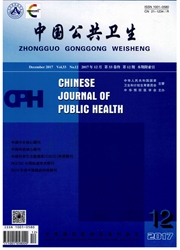

 中文摘要:
中文摘要:
目的分析心肌梗塞患者住院医疗费用构成及其主要影响因素,提出针对性的对策和措施,为合理控制医疗费用提供参考依据。方法收集天津市2004年1月—2007年12月确诊的心肌梗塞患者共1 602例,分析其费用构成,采用多元线性回归筛选住院费用的影响因素。结果天津市2004—2007年心肌梗塞患者人均住院费用为24 428.82元;心肌梗塞患者药品费、检查费、治疗费、手术费、床位费、医用材料费、输全血费、成分输血费和其他费用分别为5 726.42元(23.44%)、2 279.89元(9.33%)、3 017.60元(12.35%)、396.66元(1.62%)、480.37元(1.97%)、12 389.22元(50.72%)、29.33元(0.12%)、76.32元(0.31%)和33.00元(0.14%);多元线性回归分析结果表明,手术与否、医院等级、人员类别、住院次数、住院天数、年龄是住院费用的影响因素(P〈0.05)。结论合理减少心肌梗塞病人的住院天数,控制医用材料、药品费用的不合理增长,是降低心肌梗塞患者住院费用的有效措施。
 英文摘要:
英文摘要:
Objective To examine hospitalization expense and its main influencing factors among myocardial in- farction patients and to provide references for controlling the excessive increase in medical expense. Methods Totally 1 602 myocardial infarction patients in Tianjin city were recruited from January 2004 to December 2007. Descriptive anal- ysis and multiple linear regression method were performed. Results The mean hospitalization cost was 24 428. 82 RMB Yuan per myocardial infarction patient in Tianjin from 2004 to 2007. The iterms of the hospitalization cost were medicine (5 726. 42 Yuan,23.44% ) ,inspection(2 279. 89 Yuan,9.33% ) ,treatment(3 017.60 Yuan, 12. 35% ) ,surgery(396. 66 Yuan, 1.62% ) ,bed fee(480. 37 Yuan,1.97% ) ,materials( 12 389. 22 Yuan,50. 72% ) ,whole blood transfusion(29.33 Yuan,0. 12% ) ,blood component transfusion(76.32 Yuan,0. 31% ) ,and other costs(33.00 Yuan,0. 14% ). The results of multiple linear regression showed that surgery, grade of hospital, social-economic status of the patient, number of admission, duration of hospitalization, and age were the main influencing factors of the hospitalization cost. Conclusion The hospitalization expense of myocardial infarction patients should be reduced by decreasing the duration of hospitaliza- tion and controlling the unreasonable increase of material and medicine fee.
 同期刊论文项目
同期刊论文项目
 同项目期刊论文
同项目期刊论文
 期刊信息
期刊信息
